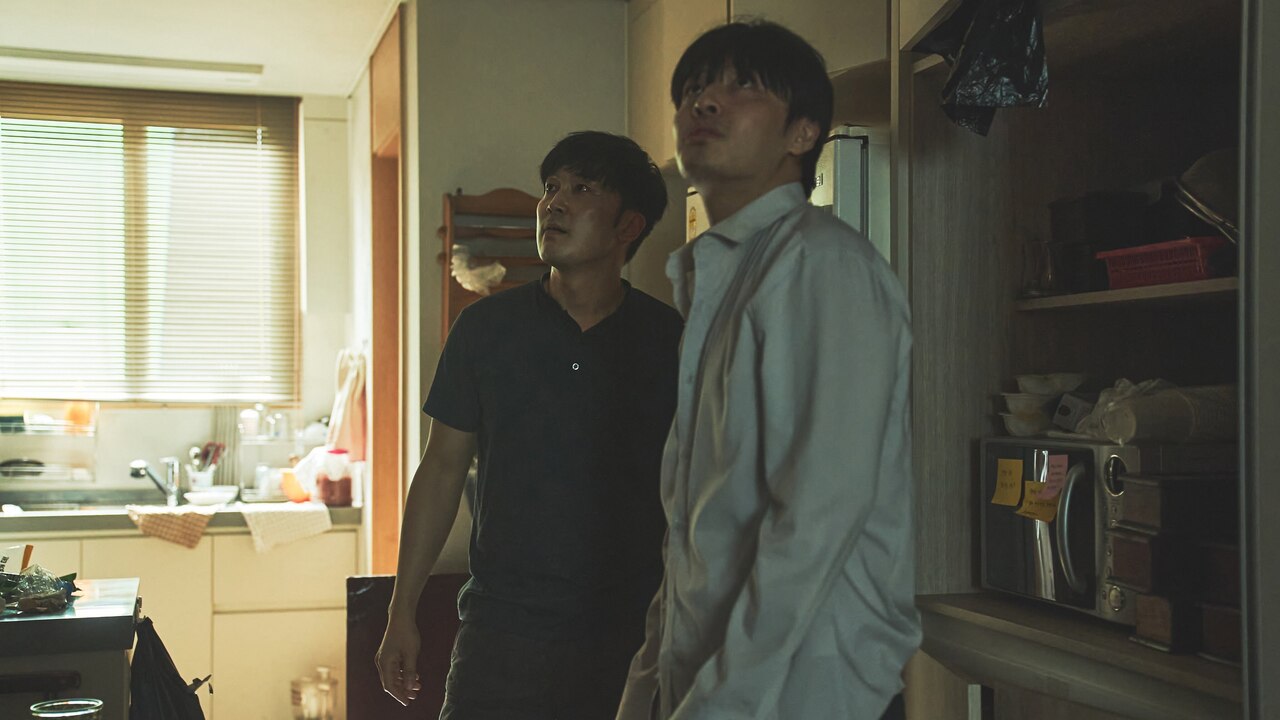
Kim Tae-joon is a man of one-line "what ifs," a man of ideas. What if your phone falls into the hands of a stalker? What if you end up living in an apartment that's infected with noise problems? If Tae-joon asked that first question in Unlocked/Seumateuponeul tteoreotteuryeosseul ppuninde, he poses the second one in Wall to Wall/84 Jegopmiteo (streaming on Netflix from July 18). For a while, it's easy to sit back and revel in the writer-director's absurdly calculated mayhem. In Wall to Wall, he creates a pitiable punching bag named Noh Woo-sung (Kang Ha-neul) and hits him with noise, fists, hammers, and financial troubles. Woo-sung, an assistant manager, empties his savings account, takes out a credit loan, and sells Meta Coin to become a homeowner in Seoul. It's apparently a significant achievement - everybody wants to buy a house. When Woo-sung asks the seller how the cost of the apartment jumped to ten million won in just an hour, he's told he can either take the deal or leave it for other buyers—buyers who wait eagerly, like vultures, to grab the apartment. But Tae-joon doesn't give Woo-sung much time to enjoy his moment of happiness. In fact, he always keeps happiness at an arm's length from his character. Tae-joon teases Woo-sung with a happily-ever-after; he places a thin, transparent door between Woo-sung and his heaven.
Hence, after Woo-sung finally moves into his new residence, there's no house party, no celebration. The room is sparsely furnished, with empty bottles and plastic wrappers scattered across the floor. To save money on the electricity bill, the lights are mostly turned off, which also means that no air conditioner is used for relief from the hot weather. Woo-sung struggles to get his eight-hour sleep due to the constant noise coming from the upper floor. When he wakes up in the middle of the night or to the alarm on his phone, we see him drenched in sweat, as if he had been asleep in the shower. It's a total mess, and yet, Woo-sung is the kind of man who has an optimistic "I Can" wallpaper on the phone because he needs all the motivation he can get to go through his daily, mundane existence. Tae-joon photographs the apartment with gloomy lights and a creepy atmosphere. The corridors feel cramped, and the walls seem to close in on Woo-sung, creating a suffocating, claustrophobic environment. The unpleasant noises drive Woo-sung mad, and his madness becomes the source of pleasure, drama, and dark humor. There is also a hint of horror thrown into the mix with eerie images, such as when a woman standing behind Woo-sung, who leaves sticky notes on his door, appears to be an evil spirit when the automatic light in the corridor turns off. Wall to Wall, though, reaches its zenith during two sequences. One deals with a nightmare, while the other superbly tilts towards craziness when Woo-sung attempts to click a button on the computer at the police station.
However, something happens to Wall to Wall after that scene at the police station. Suddenly, the movie experiences a sharp dip in its energy, as if it has expended all its power in executing this nutty joke. Tae-joon doesn't exactly run out of amusing ideas. He does something unexpected with a gun in the climax; still, the fun remains on paper. Tae-joon throws in a journalist/a hacker (shades of Unlocked can be found here)/a vigilante with a twisted notion of justice, and a rich, bad person, but these elements are not unified with the kind of dark humor that pervades the film until the scene set at the police station. Everything suddenly starts to feel dull. Once you are disconnected from the story, you come up with "logical questions." Why didn't that Crypto Poor call Woo-sung (he's House Poor) after Liberation Day to check if he had received the profits or not? Why does no one from Woo-sung's office call him to ask him to report back to work (he took leave till the Liberation Day, as far as I remember)? We are told that Woo-sung broke off his engagement, but no reason is offered. He's made single so that the movie can crush him from all sides, from every corner. Woo-sung is a puppet. He also represents the ordinary citizens of Seoul who just want to live peacefully in a home they bought after going through a lot of hassle. Eun-hwa (Yeom Hye-ran), the residents' representative, stands in for the wealthy, profit-driven businessmen, and Jin-ho (Seo Hyun-woo) is a journalist who wants the truth to come out in the open. Woo-sung is squeezed between these two different entities, these two different worlds, which is probably just Tae-joon's way of saying that the people of Seoul are trapped between the influential elites and sensational media houses. Their greed, their goals, and their bickering noises have disturbed the peace of Seoul. It's a pity that the movie itself descends into chaos and loses the necessary appeal to hit its mark. Wall to Wall ultimately fails to deliver either a good comedy or an effective social message/satire.
Final Score- [5/10]
Reviewed by - Vikas Yadav
Follow @vikasonorous on Twitter
Publisher at Midgard Times
Release Date: July 18, 2025, on Netflix
Get all latest content delivered to your email a few times a month.
Bringing Pop Culture News from Every Realm, Get All the Latest Movie, TV News, Reviews & Trailers
Got Any questions? Drop an email to [email protected]